Share
Working at ESO
Are you interested in working in areas of frontline technology and in a stimulating international environment? Do you feel your profile matches our requirements? Learn more about our current vacancies and apply online. Read more..
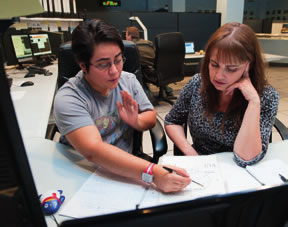
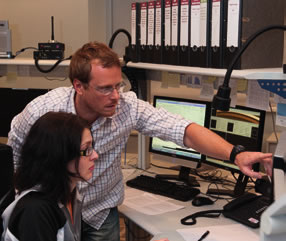

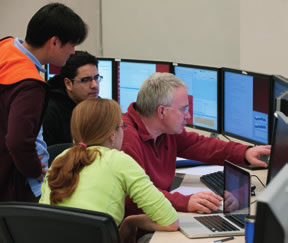
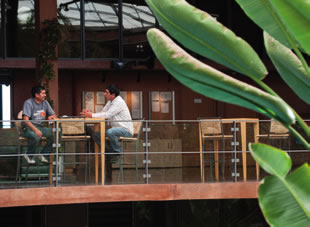

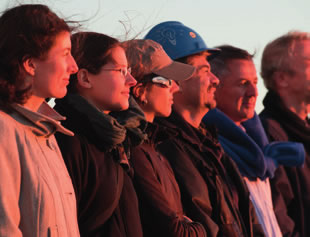
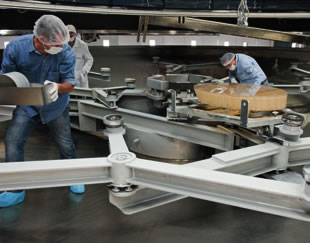
The European Organisation for Astronomical Research in the Southern Hemisphere (ESO) is the foremost intergovernmental astronomy organisation in Europe and the world's most productive ground-based astronomical observatory. ESO carries out an ambitious programme focused on the design, construction and operation of powerful ground-based observing facilities enabling astronomers to make important scientific discoveries.
ESO operates three unique world-class observing sites in northern Chile: La Silla, Paranal and Chajnantor (home to ALMA and APEX), and the ESO Headquarters are located in Garching, near Munich, Germany.
At Paranal, ESO operates the Very Large Telescope, the world's most advanced visible-light astronomical observatory. ESO is a major partner in ALMA, the largest astronomical project in existence. And on Cerro Armazones, close to Paranal, ESO is building the 39-metre Extremely Large Telescope, which will become 'the world's biggest eye on the sky' and whose operations will be fully integrated into Paranal Observatory.
For its Science Operations Department at the Paranal Observatory in Chile, ESO opens an International Staff Member position of:
Operations Staff Astronomer
Paranal
Deadline 16/06/2023
Paranal Science Operations (PSO) astronomers play a key role in optimizing the scientific return of the world leading astronomical facility.
PSO is responsible for the efficient execution of the scheduled observations, and in providing the highest quality data to our users in the worldwide astronomical community. The department is also charged to maintain and where possible improve the scientific and operational performance of the VLT(I)'s astronomical instruments. Astronomers in the department chair the Instrument Operation Teams (IOTs). PSO is strongly involved to develop and implement integrated operations of the VLT and ELT into Paranal, in the context of the Integrated Operations (IOP) Programme .
The successful candidate will have the opportunity to gain and provide expert knowledge on novel instrumentation and become closely involved in operations development towards the ELT. They will be given the responsibility for an instrument at the Very Large Telescope or future ELT. Flexibility exists to tailor duties and responsibilities according to personal expertise and interests.
Main Duties and Responsibilities:
The successful candidate will:
- Contribute to the science operations activities for both visitor and service mode at Paranal Observatory. This includes planning and execution of observations, providing quality assurance and quality control of the scientific data obtained, supporting visiting astronomers, and the calibration of instruments.
- Become instrument scientist for one of the current or future instruments at VLT and ELT. Activities include
- Improve operations and scientific performance
- Definition, implementation, optimization, and characterization of new observing modes
- Set-up of optimized calibration plans
- Contribute to the operations-readiness of the upcoming generation of VLT(-I) and ELT systems.
- Support the operational development of Paranal towards an integrated VLT-ELT Observatory, in the context of the Integrated Operations (IOP) Programme.
The successful candidate will be part of ESO's astronomy faculty and be appointed at the level of Assistant or Associate Astronomer. They will be expected and encouraged to carry out a sustainable scientific research program that enables them to
- Interact at peer level with the user community, including instrument consortia and high profile researchers
- Understand and drive instrument performance from a scientific point of view
Functional duties are carried out for the equivalent of up to 105 nights per year at the Observatory, in either day-, night- or mixed shifts on site. Functional work pursued off-site (e.g., at the ESO campus in Santiago) accordingly reduces the required nights to be spent on site. The rest of the time is spent on personal scientific research at the ESO campus in Santiago. A certain fraction of the work may be performed remotely, according to ESO's mobile working policy.
Assessment of overall performance includes both functional duties and personal research.
ESO provides various types of financial support to its faculty members, including but not limited to conference participation and organization, scientific visits, PhD studentships.
Reports to:
The Head of the Paranal Science Operations Department in Chile.
Experience:
We seek a staff astronomer with instrument scientist skills, with excellent observing and/or operational experience in areas relevant to VLT(-I) and ELT instrumentation, with at least 3 years after the PhD. Demonstrated participation to commissioning and/or development of new instruments will be an asset.
Key Competences:
Required:
- Strong background in state-of-the-art observing techniques available at Paranal. Such techniques include interferometry and extreme adaptive optics, high resolution and multi-object spectroscopy, and time-resolved photometry in the optical and near-to-mid infrared wavelength regions.
- Excellent observation-oriented research records and a sustainable future research program, that enables them to interact at peer level with the user community, and drive instrument performance from a scientific point of view.
- A keen interest in quality control of astronomical data
- Deep familiarity with data analysis. Conversant with at least one major data reduction environment (e.g., ESO EsoRex, IRAF, IDL)
- Good working knowledge of python.
Desirable:
- Proven ability to identify technical issues and potential risks, and experience with real-time troubleshooting.
- Demonstrated participation to development and/or commissioning in instrumental areas relevant for the VLT-ELT.
Very good self-organization and time management is a must, coupled with the ability to prioritize multiple tasks. Communication and interpersonal skills are required, with the ability to adapt and to work efficiently in a multi-cultural environment, both independently and within a team. A strong sense of team spirit is essential.
Qualifications:
Ph.D. in Astronomy, Physics or equivalent
Language Skills:
The position requires proficient knowledge of English. A working knowledge of Spanish, or a willingness to learn it, would be advantageous.
Remuneration and Contract:
We offer an attractive remuneration package including a competitive salary (tax free), comprehensive pension scheme and medical, educational, and other social benefits, as well as financial help in relocating your family, if needed. ESO aims to support members of personnel in maintaining a good work-life balance between their professional and private life (https://www.eso.org/public/jobs/conditions/intstaff/#work-life-balance). ESO is also committed to offering family-friendly support (https://www.eso.org/public/jobs/conditions/intstaff/#family-friendly-support), creating a work environment and policies which allow staff to balance their professional and private responsibilities/ through flexible working arrangements and financial support for families.
The contract is for a fixed term duration of three years and is subject to successful completion of the probation period. Under certain circumstances there is the possibility of contract extension(s), subject to individual performance and organisational requirements, and as defined in the applicable policies and staff rules and regulations. Please note that the contract policy and in particular the regulations concerning fixed-term and indefinite contracts are currently under review which may lead to changes in the contractual conditions applicable to this position.
Duty Station:
- Paranal Observatory, near Antofagasta (130 km. South), Chile.
- ESO offices in Vitacura, Santiago. A certain fraction of the work may be performed remotely, according to ESO's mobile working policy.
Career Path: V
Application:
If you are interested in working in areas of frontline technology and in a stimulating international environment, please visit http://www.eso.org for further details. Also check the job webpage of the Paranal Science Operations Department (http://www.eso.org/sci/facilities/paranal/sciops/jobs.html).
Applicants are invited to apply online at https://recruitment.eso.org/. Applications must be completed in English and should include a motivation letter, research statement including a research plan, and a CV (with list of publications).
The position also requires three letters of reference to be submitted before the application deadline.
Closing date for applications is June 16, 2023.
ESO Values
An important element in any successful employment relationship is harmony in values between an organisation and its people.
The ESO values are:
ESO strives for excellence through innovation.
ESO provides outstanding services to its communities.
ESO fosters diversity & inclusion.
ESO believes in the key role of sustainability for its future.
Achieving the above are recognized as only possible on the basis of personal values and attitudes that we expect from our employees: respect, integrity, accountability, commitment, collaboration, and clear & open communication.
Applicants to any ESO role are asked to reflect on their affinity with these values and advised they may be asked about them if called for interview.
Diversity
ESO has established diversity as an important value of the Organisation, is committed to providing an equal opportunities environment and is actively seeking to promote a diverse, equitable and inclusive workforce. Please visit https://www.eso.org/public/about-eso/sustainability/dei-at-eso/ for further details.
Nationality
No nationality is in principle excluded from employment at ESO, however, recruitment preference will be given to nationals of our Member States, host states and strategic partners: Australia, Austria, Belgium, the Czech Republic, Denmark, Finland, France, Germany, Ireland, Italy, the Netherlands, Poland, Portugal, Spain, Sweden, Switzerland, the United Kingdom and Chile, irrespective of gender, age, disability, sexual orientation, ethnicity or religion.
